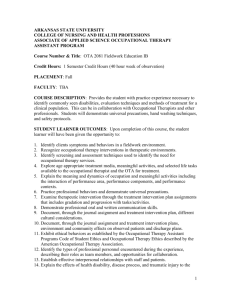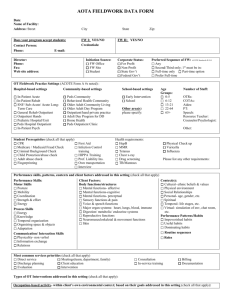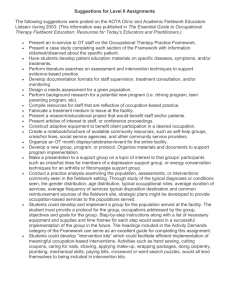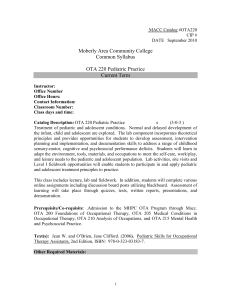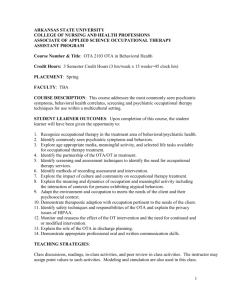OTA 215 Mental Health & Psychosocial Practice
advertisement
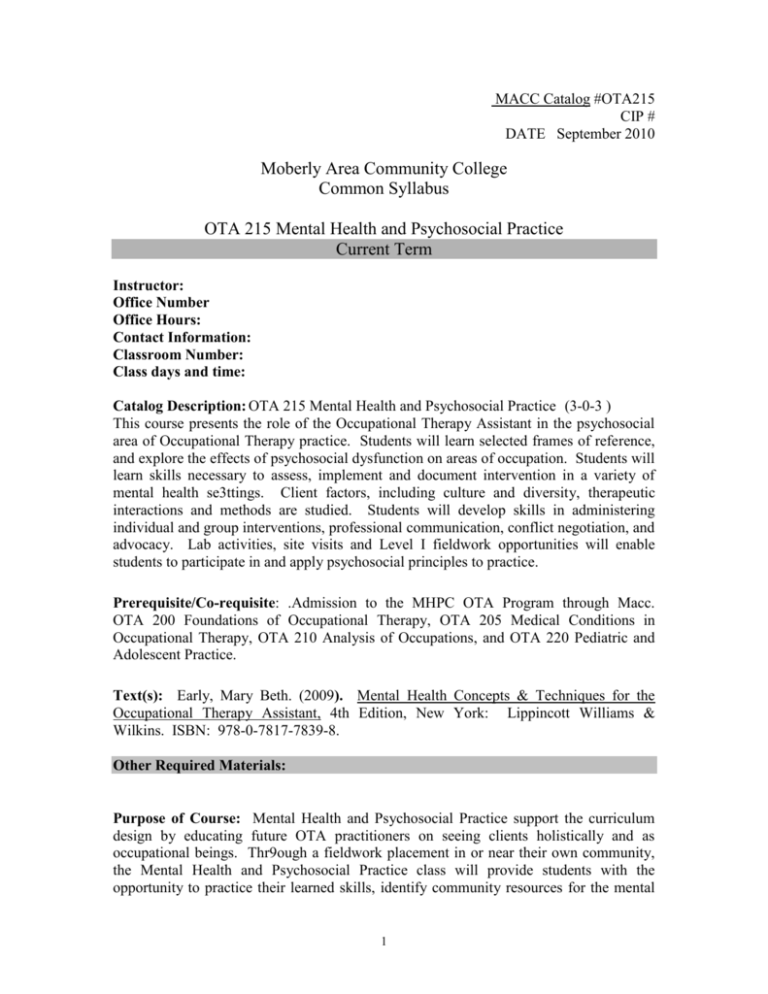
MACC Catalog #OTA215 CIP # DATE September 2010 Moberly Area Community College Common Syllabus OTA 215 Mental Health and Psychosocial Practice Current Term Instructor: Office Number Office Hours: Contact Information: Classroom Number: Class days and time: Catalog Description: OTA 215 Mental Health and Psychosocial Practice (3-0-3 ) This course presents the role of the Occupational Therapy Assistant in the psychosocial area of Occupational Therapy practice. Students will learn selected frames of reference, and explore the effects of psychosocial dysfunction on areas of occupation. Students will learn skills necessary to assess, implement and document intervention in a variety of mental health se3ttings. Client factors, including culture and diversity, therapeutic interactions and methods are studied. Students will develop skills in administering individual and group interventions, professional communication, conflict negotiation, and advocacy. Lab activities, site visits and Level I fieldwork opportunities will enable students to participate in and apply psychosocial principles to practice. Prerequisite/Co-requisite: .Admission to the MHPC OTA Program through Macc. OTA 200 Foundations of Occupational Therapy, OTA 205 Medical Conditions in Occupational Therapy, OTA 210 Analysis of Occupations, and OTA 220 Pediatric and Adolescent Practice. Text(s): Early, Mary Beth. (2009). Mental Health Concepts & Techniques for the Occupational Therapy Assistant, 4th Edition, New York: Lippincott Williams & Wilkins. ISBN: 978-0-7817-7839-8. Other Required Materials: Purpose of Course: Mental Health and Psychosocial Practice support the curriculum design by educating future OTA practitioners on seeing clients holistically and as occupational beings. Thr9ough a fieldwork placement in or near their own community, the Mental Health and Psychosocial Practice class will provide students with the opportunity to practice their learned skills, identify community resources for the mental 1 health population, and advocate for mental health clients and their families within their community. Students will not only practice and learn how to use traditional methods of locating research based methods, such as medical journals and textbooks, but also how to utilize the internet to locate appropriate treatment methods and evaluate their effectiveness. The utilization of the internet and online learning opportunities will foster and promote life-long learning of the students, as they will be able to determine appropriate training, methods, education, research, and their own accessibility to materials online. Course Objectives: 1. 2. 3. 4. 5. 6. 7. 8. 9. 10. 11. 12. 13. 14. Demonstrate oral and written communication skills. Employ logical thinking, critical analysis, problem solving, and creativity. Demonstrate competence in basic computer use, including the ability to use databases and search engines to access information, word processing for writing, and presentation software. Demonstrate knowledge and understanding of human development throughout the life span (infants, children, adolescents, adults, and elderly persons). Course content must include, but is not limited to, developmental psychology. Demonstrate knowledge and understanding of the concepts of human behavior to include the behavioral and social sciences (principles of psychology, sociology, abnormal psychology). Demonstrate knowledge and appreciation of the role of sociocultural, socioeconomic, and diversity factors and lifestyle choices in contemporary society (principles of psychology, sociology, and abnormal psychology) Articulate the influence of social conditions and the ethical context in which humans choose and engage in occupations. .Articulate to consumers, potential employers, colleagues, third-party payers, regulatory boards, policy makers, other audiences, and the general public both the unique nature of occupation as viewed by the profession of occupational therapy and the value of occupation to support participation in context(s) for the client. Understand the effects of physical and mental health, heritable diseases and predisposing genetic conditions, disability, disease processes, and traumatic injury to the individual within the cultural context of family and society on occupational performance. Use sound judgment in regard to safety of self and others, and adhere to safety regulations throughout the occupational therapy process. Express support for the quality of life well-being, and occupation of the individual, group, or p0opulation to promote physical and mental health and prevention of injury and disease considering the context (cultural, physical, social, personal, spiritual, temporal, virtual). Explain the need for and use of compensatory strategies when desired life tasks cannot be performed. Apply models of occupational performance and theories of occupation. Describe basic features of the theories that underlie the practice of occupational therapy. 2 15. 16. 17. 18. 19. 20. 21. Describe models of practice and frames of reference that are used in occupational therapy. Gather and share data for the purpose of evaluation client(s)’ occupational performance in activities of daily living (ADL), instrumental activities of daily living (IADL), education, work, play, leisure, and social participation. Evaluation of occupational performance includes: a. The occupational profile, including participation in activities that are meaningful and necessary for the clients to carry out roles in home, work, and community environments. b. Client factors, including body functions (neuromuscular, sensory, visual, perceptual, cognitive, mental) and body structures (cardiovascular, digestive, integumentary systems). c. Performance patterns (habits, routines, roles) and behavior patterns. d. Cultural, physical, social, personal, spiritual, temporal, and virtual contexts and activity demands that affect performance. e. Performance skills, including motor (posture, mobility, coordination, strength, energy) process (energy, knowledge, temporal organization, organizing space and objects, adaptation) and communication and interaction skills (physicality, information exchange, relations). Select and provide direct occupational therapy interventions and procedures to enhance safety, wellness, and performance in activities of daily living (ADL), instrumental activities of daily living (IADL), education, work, play, leisure, and social participation. Provide therapeutic use of occupation and activities (occupation-based activity, practice skills, preparatory methods). Provide therapeutic use of self, including one’s personality, insights, perceptions, and judgments as part of the therapeutic process in both individual and group interaction. Effectively interact through written, oral, and nonverbal communication with the client, family, significant others, colleagues, other health providers, and the public in a professionally acceptable manner. Promote the use of appropriate home and community programming to support performance in the client’s natural environment and participation in all contexts relevant to the client. Assessment of Student Learning: Student learning will be continually assessed throughout the semester through objective online quizzes, written assignments, online group work, mid-term, final, and final project presentation. Description of Major Assignment(s)/Project(s): Lab Assignments: Media Group Planning 3 Online & Class Assignments: 15%=150 points 7 Group/individual discussion questions and responses (10 points) Personal daily schedule completion (10 points) Writing quiz questions (2 total; 10 points) Similar interests activity (10 points) DSM website review (10 points) Behavior programs (10 points) Home Safety recommendations (10 points) Treatment group idea (group choice) (10 points) Treatment group idea for depression (10 points) Mental Health Assessments/Evaluations search (10 points) Tx group idea for anger management (10 points) Tx group ideas for stress management (10 points) Community Resources for leisure (10 points) Sensory-based adult group treatment (10 points) Grade/adapt previous group (10 points) Fieldwork Assignments: 25%=250 points 2 reflections/questions & 2 responses (x9) (15%=37 points) Review of client chart/record/file (10%=25 points) Interview of professional (10%=25 points) Group observation (2) (10%=25 points) Group plan (15%=38 points) Group implementation (30%=75 points) Student evaluation (10%=25 points) Quizzes: 10%=100 points Mid-Term: 15%=150 points Final: 20%=200 points Character Case Study: 15%=150 pints TOTAL CLASS PINTS = 1000 points 4 ATTENDANCE POLICY: Missouri Health Professions Consortium (MHPC) The policy reads: Students enrolled in the Missouri Health Professions Consortium (MHPC) are expected to attend classes regularly and may be dismissed for inattention to their academic responsibilities. A faculty member may use attendance, or lack of attendance, as a criterion in the determination of a course grade. Permission to make up class work missed as a result of absence is granted at the discretion of the individual instructor. Under most circumstances, students who have been absent from classes due to physician-documented illness or hospitalization will be allowed an opportunity to make up work missed. If more than three weeks of class in a regular semester have been missed, students should be encouraged to withdraw from MHPC. Missouri Health Professions Consortium (MHPC) ATTENDANCE POLICY All absences must be reported to the MHPC (573-884-5689) prior to the start of class. Occupational Therapy Assistant students are expected to attend all scheduled class sessions. A student who does not attend class regularly may lose points for attendance or class participation. Each class session will be given a value of 2 points towards total course points; after the first excused, missed class two points will be deducted from total attendance point value for each class session missed. All unexcused class absences will result in a 2-point deduction. Point values and opportunities to make up lost class time may be adjusted at the discretion of each individual course instructor of record. Students absent for 30% of the class will be required to withdraw from the class and repeat the class at the discretion of the Department Chair. Occupational Therapy Assistant students are expected to attend all scheduled fieldwork sessions and may be dismissed for inattention to their academic and fieldwork responsibilities. Attendance or absence is defined as being absent from all or part of a scheduled fieldwork session. Prior to any absence, it is the student’s responsibility to notify the fieldwork educator and the course instructor. Faculty may use attendance, or lack of attendance, as a criterion in the determination of a course grade. Permission to make up fieldwork sessions and assigned work is granted at the discretion of the Fieldwork Educator and the course instructor. Typically, students who have been absent from fieldwork due to illness or hospitalization will be allowed an opportunity to make up work missed. ACADEMIC POLICY The Missouri Health Professions Consortium (MHPC) considers academic dishonesty a serious offense. Students are expected to be familiar with their home campus’ definitions and explanations of academic dishonesty. MHPC will uphold and refer to those definitions. The department will not tolerate plagiarism, cheating, unauthorized possession of exams or exam questions/information, tampering with instructor’s grade book or grades, or in any way producing class work, papers, or exams through deceptive, illegitimate means. 5 Any student who commits an act of academic dishonesty is subject to disciplinary action and possible dismissal from the program. Academic honesty is fundamental to the activities and principles of a program. All members of the academic community must honorably have acquired, developed, and presented. Any effort to gain an advantage not given to all students is dishonest whether or not the effort is successful. The academic community regards academic dishonesty as an extremely serious matter, with serious consequences that range from probation to expulsion. When in doubt about plagiarism, paraphrasing, quoting, or collaboration, consult with the course instructor. MHPC Statement) - AMERICANS WITH DISABILITIES ACT Students who have disabilities that qualify under the Americans with Disabilities Act (ADA) should register with their home campus if requesting accommodations and/or assistance. All members of the Missouri Health Professions Consortium comply with ADA guidelines. If you have special needs as addressed by the Americans with Disabilities Act (ADA) and need assistance, please notify the course instructor immediately and/or contact the Access/ADA Office at your college to confidentially discuss disability information, academic accommodations, appropriate documentation and procedures. Students may register for assistance through the Office of Access and ADA Services through their respective home campuses. Respective ADA college contact information is listed below: MACC: The Office of Access and ADA Services is located in the Main Library and the phone number is (660) 263-4110 ext. 11240. Students may also contact the Columbia office at (573) 234-1067 ext. 12120. 6
